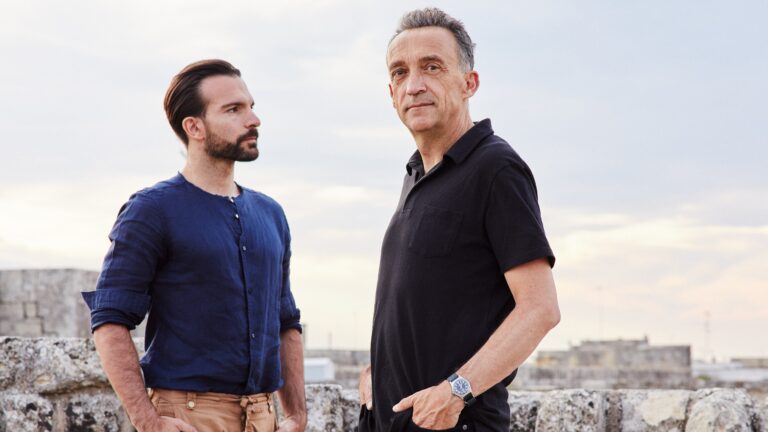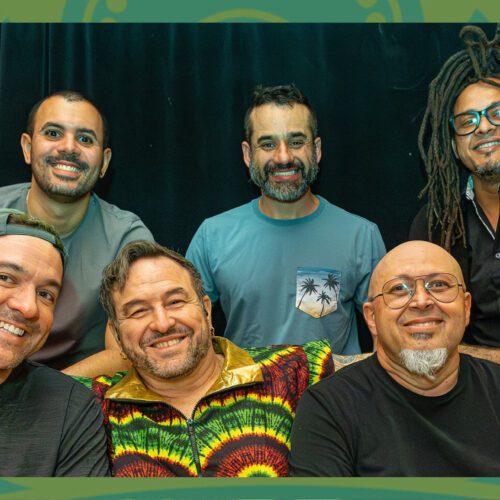Additional Information
Renowned for his significant collaborations with Robert Plant, Tinariwen, Rachid Taha, and Juldeh Camarahe the distinguished English guitarist, Justin Adams, took the time to talk to us and shed light on his latest project with Italian folk-artist, Mauro Durante. Justin and Mauro play at Club Balattou on the 9th of Feburary at 2100
PAN M 360 : Hey there Justin, thanks for tuning in. Did I catch you in London?
Justin Adams : Well actually I live in a town about two hours away from London. I’m a Londoner by origin, but I’ve become a bit of a country man.
PAN M 360 : I see. And so you’ll be starting your tour with Mauro pretty soon then. What exactly is this little circuit you’ve got going on?
Justin Adams : You know, it’s us dipping our toes into an ocean really. We’ve been touring around Europe for a couple of years. On and off. And we’ve just done two gigs in the United States, but we haven’t played in Canada at all before, at least not as this duo. It’s very exciting. And although we’ve done things with people who are well known, we’re not necessarily ourselves particularly well known. So the question is, is anybody going to come up and see the shows?
PAN M 360 : When I saw you were playing, I was kind of stoked. I heard about you thanks to the TinyDesk x globalFest show, and as a guitarist myself I really like what you do. Very cool to hear the different guitar styles coming together in your playing. I saw that you have a diplomatic background, and I can see how that might have influenced your musicality from a young age.
Justin Adams : Well, that’s a really nice thing to say. I mean, I suppose I’m kind of a guitarist for whom it’s not really about the guitar. I’m more interested in the overall vision of music and how I hear music as a music fan. And I guess, you know, my own particular history of listening to music was growing up with my parents in the States in the 60s.
That was the time of the Beatles, but also, you know, like Joan Baez and all of that. So that was very real. And I had elder brothers and sisters and I also felt that huge kind of generational change, and the role music played in all that. Then I got used to hearing some Arabic music as a child, and since I didn’t speak Arabic, you get used to really kind of listening to the emotion in music and really listening to the rhythms and the colours of the sound. I love the Arab idea of what they call Tarab, the enchantment that one gets from music, the catharsis. And I got to experience that when I got back to the UK but in a totally different way, now it was punk. The Clash, the Pistol, Patti Smith, television. I saw all those bands, you know. The lovely thing was the connection with Reggae. So I saw Bob Marley and Burning Spear and Culture and Black Uhuru. We used to go to Carnival in London and listen to the sound systems. My God. Yeah. Just incredible.
So when I look at the guitar I see the connections between Africa, the Arab world, you know, India, Pakistan, right through Europe to the States and Canada. I feel that I can see the history of this instrument as it travels from place to place.
PAN M 360 : Do you find yourself treading new ground with this project specifically, getting out of your comfort zone?
Justin Adams : In a way there’s always continuity, you know, because you try and sort of find your voice and the things that interest you. And the more I look back, I sort of think, well, it’s always the same, the same old stuff that I’m interested in. And yet it’s completely new. I’d never played in a duo before. And when we first started working together, we had no idea, we thought, well, we might need to get a bassist or a drummer or a singer. We started playing together and we started to realise that actually it had something quite different when you just have two people playing together.
One person locking with another. There’s something really cool and special about that. So when we make records, we don’t have any extra elements, you know, it’s just like the two of us just playing. So that’s a new thing. And I really am into the amount of space that you have and how big a guitar sounds when you don’t have a bass or a keyboard or a drum kit with it. The guitar is a massive sounding instrument, electric guitar, you know, like especially if you take your low E string down to D or C. Sometimes on recordings I do, I’m thinking, wow, did we put a moog on that? Just the bottom string of my Les Paul. And it’s because you haven’t got anything else in there. It’s got so much space. That’s new. And also, I really didn’t know very much about the traditional music of Southern Italy until I started this project.
I was interested in it because of its percussive nature and the idea that it’s a healing music that can be used for trance, and I was like wow, they have that in Europe? You know, I know I could tell you examples of drumming and trance and healing in Brazil, Cuba, but not so much in Europe. And I was like okay, cool, here’s a Southern European tradition that is clearly linked to North Africa.
PAN M 360 : And how did you come to meet Mauro?
Justin Adams : I got invited to this festival. They have this incredible thing, night of Taranta down in southern Italy. His band has been responsible for a huge revival in this kind of folk form of music, which was dying out. It wasn’t a professional form of music, it was like mostly peasants playing it in the village squares, and they were all aged 90 and dying. And his father, who was a teacher, started really recording things and going and making like recordings of old ladies singing songs. So, Mauro’s father was one of those 1970s leftists who was like, no, no, this is a valuable, popular tradition, you know, an oral tradition. So he started researching it. And then it’s become kind of like a really popular thing. So you like the first time I went down there, they had a free festival. There were 100,000 people doing the dance to the rhythm, you know. People were bouncing to it, young people, you know, which is cool and they’re into mixing it up with more music and they sort of dubbing it up and having heavy bass lines with it or whatever.
PAN M 360 : I had never heard of Taranta either, sounds really fascinating.
Justin Adams : Well, I think the legend is that women would be bitten by a poisonous spider and they would be knocked out by it. And this music is the thing that heals you. But there were no poisonous spiders. It’s like a metaphor for the hardships of life. Life is the spider, man. It was like life was hard, you know, life was hard for those people. So this music was a way for the community to kind of raise the spirits of everybody.
PAN M 360 : So what was the writing process like for your compositions? I’m curious as to how you navigated all these different traditions and styles.
Justin Adams : If you’re going to play music that has that hypnotic trance feel, the listener is a big part of that. So it’s not like a composed piece of music that exists outside of the listener because what you’re doing is you’re all together getting on something. It’s a bit more like the way that a DJ works, because for instance, if you suddenly feel that the audience are with you on a certain groove, you’re gonna play that groove a little bit longer. You might just give them a little bit more, you know, and so you might you’re really playing with the unit. So an improvisational element is really key.
For us, probably a song would be based on a groove, you know, a beat and and then a key or a mode, you know, and then that way it can and then it can change. I’m really interested in the way rhythms connect, you know, where one rhythm turns out to be related to another rhythm. It’s fascinating when, if I can be playing something that kind of is like a North Mississippi kind of repetitive riff, but it really is locking with the Taranta. And there’s a reason for that because all these things, they’re all based on the tension between three and four, syncopation.
PAN M 360 : I suppose after 12 beats it all works out anyway. Thanks so much for taking the time Justin, very much looking forward to the show!
























